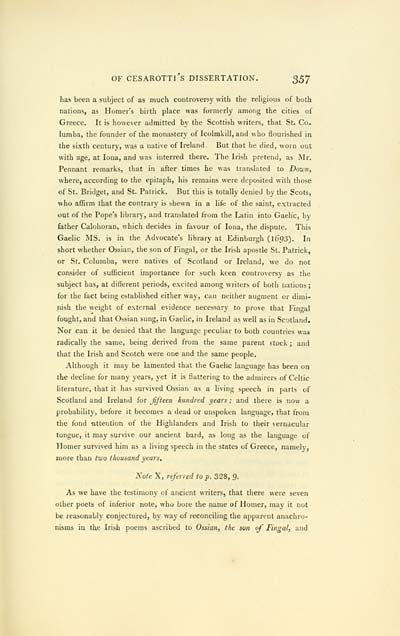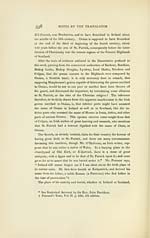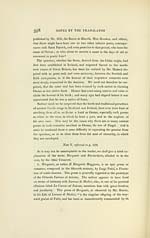J. F. Campbell Collection > Poems of Ossian > Volume 3
(369)
Download files
Complete book:
Individual page:
Thumbnail gallery: Grid view | List view

OF CESAROTTI S DISSERTATION. 357
has bcen a subject of as much conlroversy with the religious of both
iiations, aji Homei's birth place was formerly among the cities of
Greece. It is however admitted by the Scottish writers, that St. Co.
luraba, the founder of the monastery of lcolmkill, and who flourished in
the sixth century, was a native of Ireland. But that he died, worn out
with age, at lona, and was interred there. 'l'he Irisii pretend, as IMr.
Pennant reraarlcs, that in after times he was translated 10 Douii,
where, according lo the epitaph, his remains were dcposited with those
of St. Bridget, and St. Palrick. But this is totally dciiied by the Scots,
who afììrm that the contrary is shewn in a life of the saint, extracted
out of the Pope's library, and translated frora the Latin into Gaeh'c, by
father Calohoran, v.hich decides in favour of lona, the dispute. This
Gaelic MS. is in the Advocate's library at Edinburgh (1693). lii
short whelher Ossian, the son of Fingal, or the Irish apostle St. Patrick,
or St. Columba, werc natives of Scolland or Ireland, we do not
consider of suflìcient importance for such kcen controvcrsy as the
subject has, at ditìerent periods, excited among writers of both iialions ;
for the fact being estabhshed either way, can neilher augmcnt or diini-
nish the weight of external evidence necessary to prove that Fins'al
fought, and that Ossian sung, in Gaelic, in Ireland as well as in Scotland.
Nor can it be denied that ihe language peculiar to both countries wa»
radically the same, being derived from the sarae parent stock ; and
that the Irish and Scotch were one and the same people.
Although it raay be lamented that the Gaelic language lias been on
the decline for many years, yet it is flattering to the admirers of Celtic
literature, that it has survived Ossiaii as a living speech in parts of
Scotland and Ireland for Jifteeìi hundred years ; and there is now a
probability, before it becomes a dead or unspoken language, that from
the fond attention of the Highlanders and Irish to their vernacular
tongue, it raay survive our ancient bard, as long as the language of
Horaer survived hini as a living speech in the states of Greece, namely,
more than t-^'o thousand years,
Nofe X, refened to p. 328, 9.
As we have the testimony of aiicient writers, that there were seven
olher poets of inferior note, who bore the narae of Hoiner, inay it not
be reasonably conjectured, by way of reconciling the apparent anachro-
nisms in the Irish poeius ascribed to Ossian, the son of Fingal, and
has bcen a subject of as much conlroversy with the religious of both
iiations, aji Homei's birth place was formerly among the cities of
Greece. It is however admitted by the Scottish writers, that St. Co.
luraba, the founder of the monastery of lcolmkill, and who flourished in
the sixth century, was a native of Ireland. But that he died, worn out
with age, at lona, and was interred there. 'l'he Irisii pretend, as IMr.
Pennant reraarlcs, that in after times he was translated 10 Douii,
where, according lo the epitaph, his remains were dcposited with those
of St. Bridget, and St. Palrick. But this is totally dciiied by the Scots,
who afììrm that the contrary is shewn in a life of the saint, extracted
out of the Pope's library, and translated frora the Latin into Gaeh'c, by
father Calohoran, v.hich decides in favour of lona, the dispute. This
Gaelic MS. is in the Advocate's library at Edinburgh (1693). lii
short whelher Ossian, the son of Fingal, or the Irish apostle St. Patrick,
or St. Columba, werc natives of Scolland or Ireland, we do not
consider of suflìcient importance for such kcen controvcrsy as the
subject has, at ditìerent periods, excited among writers of both iialions ;
for the fact being estabhshed either way, can neilher augmcnt or diini-
nish the weight of external evidence necessary to prove that Fins'al
fought, and that Ossian sung, in Gaelic, in Ireland as well as in Scotland.
Nor can it be denied that ihe language peculiar to both countries wa»
radically the same, being derived from the sarae parent stock ; and
that the Irish and Scotch were one and the same people.
Although it raay be lamented that the Gaelic language lias been on
the decline for many years, yet it is flattering to the admirers of Celtic
literature, that it has survived Ossiaii as a living speech in parts of
Scotland and Ireland for Jifteeìi hundred years ; and there is now a
probability, before it becomes a dead or unspoken language, that from
the fond attention of the Highlanders and Irish to their vernacular
tongue, it raay survive our ancient bard, as long as the language of
Horaer survived hini as a living speech in the states of Greece, namely,
more than t-^'o thousand years,
Nofe X, refened to p. 328, 9.
As we have the testimony of aiicient writers, that there were seven
olher poets of inferior note, who bore the narae of Hoiner, inay it not
be reasonably conjectured, by way of reconciling the apparent anachro-
nisms in the Irish poeius ascribed to Ossian, the son of Fingal, and
Set display mode to: Large image | Transcription
Images and transcriptions on this page, including medium image downloads, may be used under the Creative Commons Attribution 4.0 International Licence unless otherwise stated. ![]()
| Early Gaelic Book Collections > J. F. Campbell Collection > Poems of Ossian > Volume 3 > (369) |
|---|
| Permanent URL | https://digital.nls.uk/81286180 |
|---|
| Description | Vol. III. |
|---|---|
| Shelfmark | Cam.1.b.5 |
| Additional NLS resources: | |
| Attribution and copyright: |
|
| Description | Volumes from a collection of 610 books rich in Highland folklore, Ossianic literature and other Celtic subjects. Many of the books annotated by John Francis Campbell of Islay, who assembled the collection. |
|---|
| Description | Selected items from five 'Special and Named Printed Collections'. Includes books in Gaelic and other Celtic languages, works about the Gaels, their languages, literature, culture and history. |
|---|

